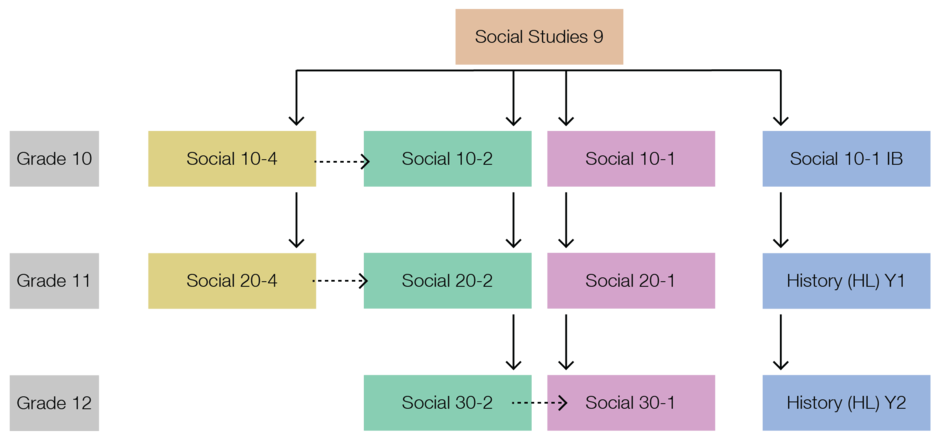The purpose of the Social Studies three-year program is to help students develop the key values and attitudes, the knowledge and understanding, and the skills and processes necessary for them to become active and responsible citizens. It concentrates on enabling students to develop an understanding of who they are, what they want to become, and the society they want to live in. Furthermore, Social Studies is an issues-focused and inquiry-based subject that draws upon history, politics, economics and current events to foster understanding of practical and ethical issues that face communities and humankind.
Social Studies 10 revolves around the theme of Globalization. In Social Studies 20, students will examine Nationalism. Finally, Social Studies 30 will guide students through a discussion of Ideologies. Students will have the choice of taking these courses at the -1 or the -2 level; the content of both streams is in many ways similar, with the difference being related to the skills students will develop.
It is important to note that post-secondary programs will require specific Social Studies courses; therefore, in choosing Social Studies courses, students are strongly encouraged to consider teacher recommendations and to check post-secondary requirements frequently.
We strongly recommend that a student has a mark of 65% or higher to continue in the -1 stream.

In the above diagram, the solid arrows denote the typical pathways and preferred transfer points a student follows to progress from course level to course level, and the dashed arrows denote potential points from course level to course level.
Courses
Social Studies -1 Stream: Social 10-1, 20-1, 30-1
5 credits
The more academically focused -1 stream allows students to enter post-secondary institutions but is not always necessary for Engineering, Math, or Science Faculties (for complete information, please contact the post-secondary institute of choice). It is recommended that a student who has a mark of 65% or higher continue in the -1 stream. At the end of Social 30-1, the students must write a provincial diploma examination.
Prerequisite: Recommend 65% or higher in previous Social Studies course.
Social Studies -2 Stream: Social 10-2, 20-2, 30-2
5 credits
The Social Studies -2 stream has a strong focus on skill building and is designed for those students who would experience difficulty in the advanced program and/or those students who do not need the -1 exam for post secondary entrance requirements. Students should be ready for active, constant participation within the classroom and be willing to take responsibility for their learning. At the end of Social 30-2, the students must write a provincial diploma examination.
Prerequisite: Recommend 50-64% in previous Social Studies courses.
Social Studies -4 Stream (K&E): Social 10-4, 20-4
The Social Studies -4 stream prepares students to earn a senior high school credential, enter the workplace upon leaving school with employability and occupational skills that meet industry standards, make successful transitions to other courses or to further education and training, and become responsible and contributing members of society.
Placement in this stream is a collaborative decision made by families and school teams.

